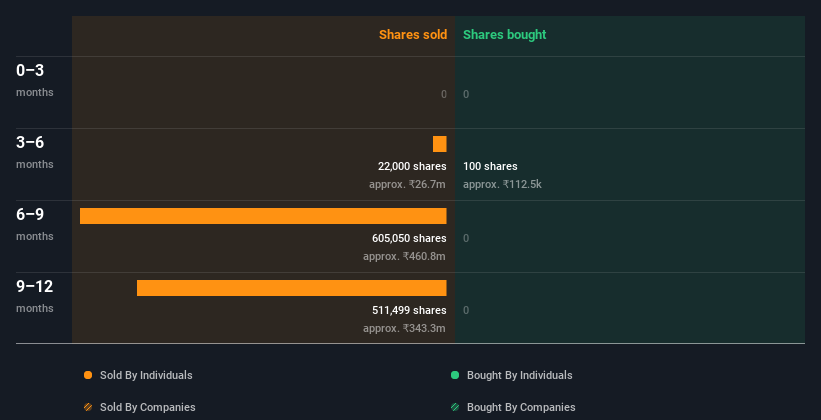- India
- /
- Electrical
- /
- NSEI:KEI
KEI Industries Limited (NSE:KEI) insiders sold ₹824m worth of stock last year which shareholders may not want to overlook

Despite a 3.8% gain in KEI Industries Limited's (NSE:KEI) stock price this week, shareholders shouldn't let up. The fact that insiders chose to dispose of ₹824m worth of stock in the past 12 months even though prices were relatively low could be indicative of some anticipated weakness.
While insider transactions are not the most important thing when it comes to long-term investing, logic dictates you should pay some attention to whether insiders are buying or selling shares.
See our latest analysis for KEI Industries
KEI Industries Insider Transactions Over The Last Year
The Chairman, Anil Gupta, made the biggest insider sale in the last 12 months. That single transaction was for ₹224m worth of shares at a price of ₹747 each. So it's clear an insider wanted to take some cash off the table, even below the current price of ₹1,200. We generally consider it a negative if insiders have been selling, especially if they did so below the current price, because it implies that they considered a lower price to be reasonable. While insider selling is not a positive sign, we can't be sure if it does mean insiders think the shares are fully valued, so it's only a weak sign. It is worth noting that this sale was only 1.7% of Anil Gupta's holding.
Over the last year we saw more insider selling of KEI Industries shares, than buying. The chart below shows insider transactions (by companies and individuals) over the last year. By clicking on the graph below, you can see the precise details of each insider transaction!

If you like to buy stocks that insiders are buying, rather than selling, then you might just love this free list of companies. (Hint: insiders have been buying them).
Does KEI Industries Boast High Insider Ownership?
Many investors like to check how much of a company is owned by insiders. Usually, the higher the insider ownership, the more likely it is that insiders will be incentivised to build the company for the long term. KEI Industries insiders own about ₹22b worth of shares (which is 20% of the company). This kind of significant ownership by insiders does generally increase the chance that the company is run in the interest of all shareholders.
What Might The Insider Transactions At KEI Industries Tell Us?
There haven't been any insider transactions in the last three months -- that doesn't mean much. While we feel good about high insider ownership of KEI Industries, we can't say the same about the selling of shares. Therefore, you should definitely take a look at this FREE report showing analyst forecasts for KEI Industries.
Of course, you might find a fantastic investment by looking elsewhere. So take a peek at this free list of interesting companies.
For the purposes of this article, insiders are those individuals who report their transactions to the relevant regulatory body. We currently account for open market transactions and private dispositions, but not derivative transactions.
Valuation is complex, but we're here to simplify it.
Discover if KEI Industries might be undervalued or overvalued with our detailed analysis, featuring fair value estimates, potential risks, dividends, insider trades, and its financial condition.
Access Free AnalysisHave feedback on this article? Concerned about the content? Get in touch with us directly. Alternatively, email editorial-team (at) simplywallst.com.
This article by Simply Wall St is general in nature. We provide commentary based on historical data and analyst forecasts only using an unbiased methodology and our articles are not intended to be financial advice. It does not constitute a recommendation to buy or sell any stock, and does not take account of your objectives, or your financial situation. We aim to bring you long-term focused analysis driven by fundamental data. Note that our analysis may not factor in the latest price-sensitive company announcements or qualitative material. Simply Wall St has no position in any stocks mentioned.
About NSEI:KEI
KEI Industries
Manufactures, sells, and markets wires and cables in India and internationally.
Flawless balance sheet with reasonable growth potential.
Similar Companies
Market Insights
Community Narratives



